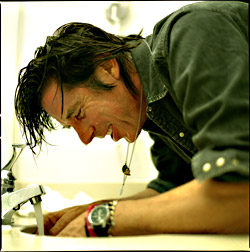John Doe’s voice is as stark, pure, and haunting as the Nevada badlands. On his current tour, listeners will hear one of the greatest voices of the punk generation without its usual surroundings of sonic guitars and unorthodox harmonizing, but Doe tends to downplay his gift. “People like Mick Jagger, Bob Dylan, Chrissie Hynde, or Neko Case—they have these incredible voices that can just carry the whole thing. I sound better with somebody else.”
On his most recent album, Forever Hasn’t Happened Yet, Doe sings glorious duets with Case, Grant-Lee Phillips, Kristin Hersh, and Dave Alvin’s guitar, among others. His penchant for harmony came early, as his family frequently moved from home to home, making for lots of long car rides. Sitting in the backseat, Doe would harmonize with his mother as she sang songs to keep him amused. “My mom told me I was singing harmony when I was 5 when we were singing ‘Row, Row, Row Your Boat.'”
His knowledge of harmony was deepened with music lessons and choir at school. As a teenager, listening to the Band and the Beatles, as well as being in cover bands, taught him more, but it took someone who was untrained musically to help him find the unique aesthetic that’s become a vital part of American musical history: Exene Cervenka. He and Cervenka fronted the L.A. punk band X, married, divorced, and remain best friends. “Exene always had the most original approach to harmony because she wasn’t schooled,” says Doe. “She just made up her own stuff. I definitely learned a lot from Exene—from her method, her madness, her ability to find something that shouldn’t work but does.”
Doe, of course, is known not just for how he sings but for what he sings. The lyrics in his nearly 300-song (and forever expanding) catalog mostly tell stories of heartbreak and hard luck, something that seems distinctly at odds with the life of a married man with three daughters making a living doing the things he loves—writing songs, playing music, and acting (Doe was a regular on the sci-fi TV show Roswell in addition to appearing in films). From Forever‘s smoldering first track, “The Losing Kind,” that declares, “I don’t know that I ever knew you,” to its elegiac final song, “Repeat Performance,” whose chorus begins, “I want to save you from your past/And everlasting sad nestled in your back,” Doe careens from powerful fury to staggering despair. “They’re all autobiographical—either about me or somebody who is close to me. It’s not just some sort of intellectual exercise,” he says of the songs. “You have to have personal investment in whatever you do. You have to identify in some way with it.” As for the paradox between his artistic success and the raw torment expressed in the lyrics? “There is part of me that’s not so happily married. It comes and goes.”
As a performer, Doe’s inspiration comes and goes, too. This writer has seen him perform a loose party set with X in the 1980s; a raucous, passionate band rumble in support of 1990’s Meet John Doe; and, most recently, two solo sets of classic American folk songs at a concert series for children, where he seemed distinctly ill at ease. Despite the unevenness of the shows, Doe’s stage presence makes them worthwhile. “I’m just looking for a moment that is real and comes across. Whether it’s true or honest or not, it does have to be one specific moment,” says Doe. After all these years, he continues to love performing for people. “I like the feeling of singing a song. I know plenty of performers who go through a lot of different mental changes to sometimes enjoy and sometimes not enjoy it and try to come to terms with that. Onstage is my favorite place to sing,” he says.
That goes both for his solo work and playing with a band. “On your own, you can do anything you like. At any moment you can decide to stop a song in the middle, you can slow it down or speed it up, but you don’t have the power and versatility that you have with a band,” he says. On this tour, Doe will feature songs from Forever and past solo albums, as well as new numbers and X songs. Those hoping to snag a set list are in luck—”Some people wing it and are really good at it. I can’t remember all the songs that are a possibility,” he says. “It’s a weird, meditative thing before the show—making the set list. It gets you focused on what you want to do.”








